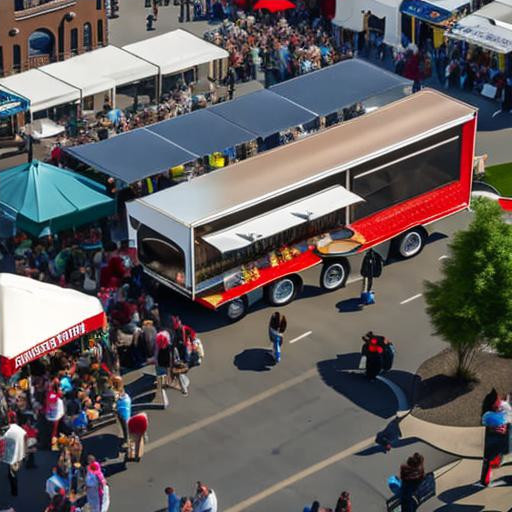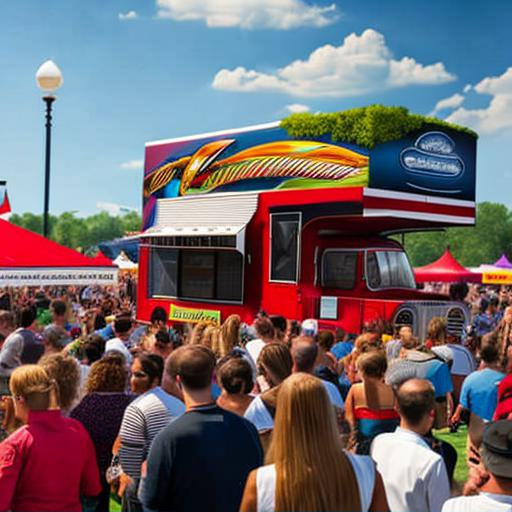

George had been looking forward to the food truck festival for weeks. He had heard that some of the best food trucks in the city would be there, and he was excited to try everything they had to offer. He had invited a few of his closest friends to come along, and they were just as excited as he was. As they made their way through the crowded streets, they could smell the aroma of different cuisines wafting through the air. The sound of music and people laughing filled their ears, and they knew it was going to be a great day.

Their first stop was at a Mexican food truck, where they tried some delicious tacos and burritos. They also tried some spicy salsa that made their taste buds tingle. Next, they headed over to a Korean food truck, where they indulged in some mouth-watering bulgogi and kimchi. The flavors were so unique and complex that George couldn't help but close his eyes and savor every bite. After that, they tried some Indian food, some Greek food, and even some vegan options. Each dish was better than the last, and they were having the time of their lives. As they made their way to the last food truck, they saw a long line of people waiting for something called "the famous fried chicken sandwich." They had heard so much about it that they decided to wait in line too. Finally, they got to the front of the line and ordered their sandwiches. The first bite was heavenly - the crispy chicken, the soft bun, the tangy sauce - it was everything they had hoped for and more. As they sat down to enjoy their sandwiches, George looked around at his friends and smiled. He realized that the best part of the day wasn't just the amazing food they had tried, but the memories they had made together.
However, just as they were finishing their sandwiches, George started to feel sick. At first, he thought it was just a minor stomachache from eating too much food, but it quickly became clear that something was seriously wrong. George's friends could see that he was in a lot of pain, and they immediately started to worry. They asked him what was wrong, but he could barely speak. He was doubled over and clutching his stomach, moaning in agony. One of George's friends knew that they needed to get him to a hospital right away. They called an ambulance and tried to keep George calm while they waited for it to arrive. It felt like an eternity, but finally, the ambulance arrived, and George was rushed to the hospital. His friends followed closely behind, terrified about what might happen to their friend. At the hospital, George was quickly taken to the emergency room. The doctors ran some tests and determined that he had a severe case of food poisoning. They told George's friends that he would need to stay in the hospital for a few days while they treated him. George's friends were relieved that he was going to be okay, but they were also filled with guilt. They realized that they had all eaten the same food at the food truck festival, but only George had gotten sick. They couldn't help but wonder if they had somehow caused his illness. Luckily, over the next few days, George recovered. His friends made a pact to never take food safety for granted again and to always be vigilant about where they ate. Eventually, George was well enough to go home, and his friends were grateful to have him back. They all realized that even though the food truck festival had ended in a scary way, it had also brought them closer together and reminded them of the importance of friendship and taking care of each other.

As George recovered from his illness in few days, he couldn't shake the feeling of anger and frustration towards the food truck that he thought had made him sick. He had always been a big supporter of local businesses, but he felt that this food truck had put his health at risk. After consulting with a lawyer, George decided to sue the food truck for damages related to his illness. He felt that it was the only way to hold them accountable and ensure that they took food safety seriously in the future. The lawsuit was a long and difficult process. George had to provide evidence that he had indeed gotten sick from eating at the food truck festival and that the specific food truck had been negligent in their food handling practices.

The food truck owner was devastated to hear about George's illness and felt truly sorry about what had happened. As a small business owner, he took pride in serving high-quality food and always made sure to follow proper food handling practices. When he received notice of the lawsuit, he was worried about the financial impact it would have on his business. He knew that he had to take responsibility for what had happened, but he also knew that he couldn't afford to pay the damages being sought by George's lawyer. The food truck owner decided to reach out to George and his lawyer to try and come to a settlement outside of court. He apologized profusely for what had happened and explained that he had taken steps to ensure that it never happened again. He also offered to pay for George's medical bills and compensate him for his pain and suffering.
Despite the food truck owner's sincere apology and offer to compensate George for his damages, both George and his lawyer were not satisfied with the amount being offered. They felt that George had suffered more than what was being compensated for and wanted to pursue more money. As a result, George decided to proceed with the lawsuit, which left the food truck owner feeling worried and stressed. He had never purchased a commercial liability insurance policy for his business, which meant that he would have to pay for the damages out of his own pocket. The lawsuit was a long and difficult process, and the food truck owner struggled to keep his business afloat as the legal fees piled up.

George ended up losing the court battle as the judge found that he had eaten food from multiple food trucks at the festival that day, making it impossible to determine which one had caused his illness. This was a blow to George, who had invested a significant amount of time and resources in pursuing the lawsuit. For the food truck owner, the outcome of the case was a relief, but it was still a bureaucratic nightmare that had cost him a significant amount of money in legal fees and lost business. He had to hire a lawyer to defend himself, and the process had taken a toll on his mental and emotional health. Despite the ruling in his favor, the food truck owner couldn't help but feel frustrated by the entire ordeal. He realized that even if he had been found not liable, the process of defending himself against the lawsuit had been costly and time-consuming. He wished that there was a way to protect himself and his business from such situations in the future.
A commercial insurance policy could have helped the food truck owner mitigate the financial impact of the lawsuit and protect his business. A typical commercial general liability insurance policy provides coverage for bodily injury or property damage that occurs as a result of your business operations. This coverage could have protected the food truck owner in the event that a customer like George had suffered from food poisoning and sued him for damages. With a commercial insurance policy, the food truck owner would have had a financial safety net to cover the costs of defending against the lawsuit, as well as any damages awarded to the plaintiff. Depending on the specifics of the policy, the insurance company may have also covered the potential costs of medical bills, lost wages, and other damages that George suffered as a result of the food poisoning incident. Without insurance coverage, the food truck owner had to pay for these costs out of his own pocket, which ultimately led to the loss of his business. With proper insurance coverage, he could have mitigated the financial impact of the lawsuit and kept his business running. In addition to general liability coverage, a commercial insurance policy can also provide coverage for other risks that small business owners face, such as property damage, theft, and business interruption. By having a comprehensive insurance policy in place, small business owners can protect themselves from the financial risks of unexpected events and lawsuits.

In this situation, the food truck owner could have benefited from a Commercial General Liability (CGL) insurance policy. A CGL policy provides coverage for claims of bodily injury or property damage that occur during business operations, including incidents such as food poisoning that may have resulted from the food truck's food. The policy can help to pay for the cost of defending against the lawsuit, as well as any settlements or judgments that are awarded to the plaintiff. CGL policies typically cover a range of risks that small business owners face, including premises liability, products liability, and completed operations liability. This type of policy can be customized to fit the specific needs of a business and can include additional coverage options such as liquor liability, cyber liability, and professional liability. In the case of the food truck owner, a CGL policy would have provided protection against the financial risks of a lawsuit, including legal fees and damages awarded to George. It would have given the food truck owner peace of mind and financial security, knowing that his business was protected in case of unexpected events. Overall, a Commercial General Liability insurance policy is an essential coverage for small businesses like food trucks that operate in public spaces and have the potential to cause bodily injury or property damage to customers.
Last Update: March 2023